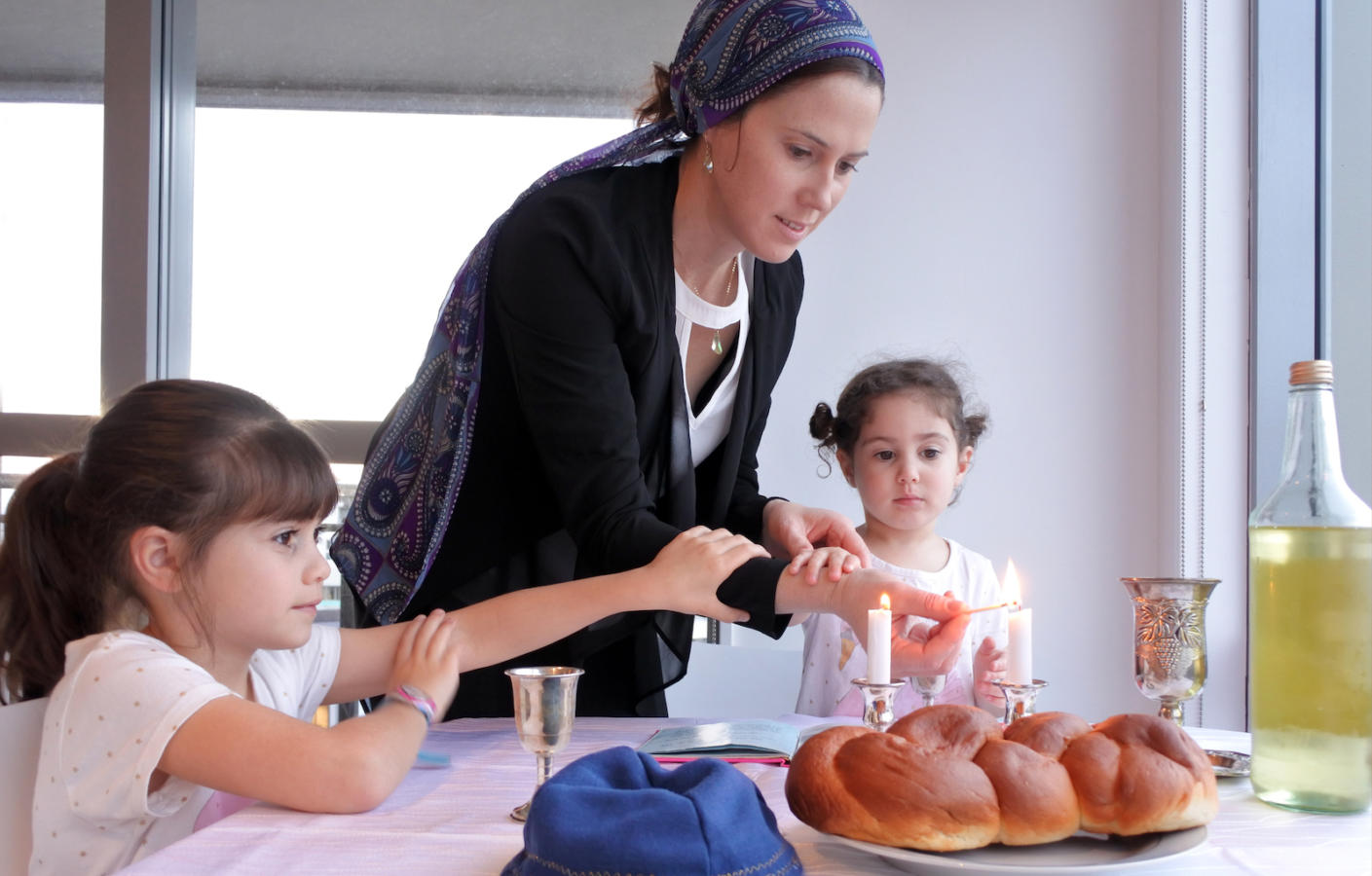You’ve been invited to a Shabbat dinner—how lovely! Shabbat dinner is one of the most beautiful and enduring Jewish rituals—an opportunity to pause from the helter-skelter of everyday life, eat food with friends old and new, and connect to Jewish tradition. If you’re not sure what to expect at Shabbat dinner, read on to find out.
Shabbat Ritual
Shabbat dinner is a festive dinner with some ritual packed in before and after the meal. A thoughtful host will walk you through it, but it doesn’t hurt to read up. This may look like a lot, but it will actually happen relatively quickly at the table. Here’s a typical Shabbat dinner routine:
- CANDLES: Depending on what time the dinner is held, it may begin with lighting candles and saying a blessing to welcome Shabbat. Many cover their eyes while the blessing is said.
- CHILDREN: Families with young ones offer the children a blessing. Parents rest their hands on the children’s heads and say a few words.
- SHALOM ALEICHEM: The next step is singing Shalom Aleichem, a song that works on the metaphor of calling down angels who will accompany the bride (Shabbat herself) into the room.
- ESHET HAYIL: In some families, a spouse might next sing Eshet Hayil, “A Woman of Valor,” to a wife.
- KIDDUSH: Kiddush is the blessing that is said over wine to mark the sanctity of Shabbat. You may be handed a cup of wine, but watch your host for the cue to sip it. The blessing is said first, and then everyone takes a sip of the wine. At some tables, each person gets their own small glass of wine. At others, a communal cup of wine is passed. Even if you are not Jewish, it is fine to sip the wine.
- HAND WASHING: Dinner-goers participate in a communal hand-washing ritual. You’ll typically see people pour water into a mug (sometimes a special one with two handles) and then pour that water over their hands multiple times, and then say a blessing. Feel free to participate in whatever way makes you comfortable. Note that many Jews do not speak between the hand-washing ritual and the next one—the blessing over the bread.
- HAMOTZI: The final ritual before the actual meal is the blessing over the bread. Someone will remove the challah cover, say the blessing, and then the bread will either be cut or torn into small pieces or passed from person to person so that everyone can take a taste. This breaking and sharing of bread is the official start to the meal.
- MEAL: Now’s the time when the meal is served. Bon appetite!
- GRACE AFTER MEALS: Many families say a longer blessing after the meal called Birkat Hamazon. Some chant the whole blessing aloud, some chat a little bit aloud and finish silently. It takes about five minutes.
- ZEMIROT: In some families, special Shabbat songs, called zemirot, are sung after the meal. They might come before or after the Birkat Hamazon, or both!
What to bring
With your help, My Jewish Learning can provide endless opportunities for learning, connection and discovery.
An appetite! You may, if you wish, bring a gift for your hosts. Flowers, a bottle of wine, a box of chocolates—whatever you think they will like. If you bring something edible and the family is observant, make sure to ask if they require the food to be kosher and (if you expect them to serve what you bring) whether they are serving a dairy or meat meal. If the meal is dairy, do not bring meat. If the meal is meat, do not bring a food that contains dairy.
What to wear
Usually, dress for Shabbat is a bit stepped up from casual, everyday clothing. Check with your host.
If you’re attending Shabbat dinner in an observant household…
First off, how do you know if they’re observant? Just ask—they’ll tell you.
Observant Jews refrain from a number of activities on Shabbat including: turning electric devices on and off, lighting a fire, ripping or tearing, writing, carrying items outside the home (if there’s no eruv), and more. There are a number of ways you can be considerate of these observances. But don’t worry about making a small mistake—they will be understanding.
- Knock, don’t ring the doorbell.
- Avoid using your electronic devices: try not to mess with your phone in public spaces and don’t take pictures. Using the phone in case of emergency is completely acceptable—indeed, required.
- When you use the bathroom, you CAN flush the toilet (sometimes people worry they cannot!) but don’t turn off the light when you leave—your host will not be able to turn it back on. Same applies to other lights in the house: don’t switch them on or off.
- Avoid bringing flowers as a gift because your host will not be able to put them in water. And if you’re not meeting them at their house, don’t bring anything to give them outside the home—so they don’t have to carry it home. You can make arrangements to drop something off before sunset if you want. This may sound strange to you, but they won’t find it odd at all.
- Don’t smoke inside the home.
Sign up for My Jewish Learning’s RECHARGE, a weekly email with a collection of Shabbat readings and more to enhance your day of rest experience.



